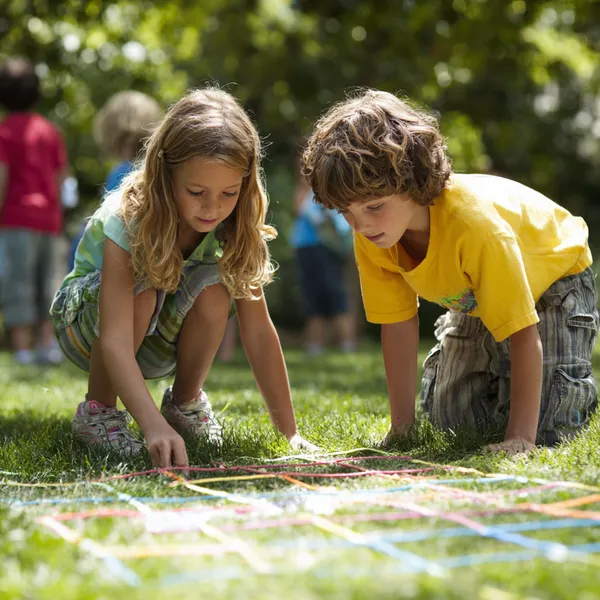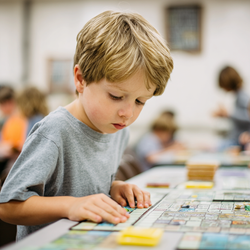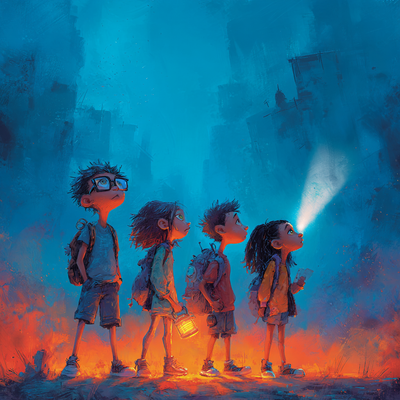Here's the updated and grammar-corrected post:
Still picking burrs out of my socks from last Saturday's church picnic. Turns out the field I thought would be perfect for games was basically a nature preserve of prickly weeds and hidden holes.
But kids had a blast. Even when half the planned activities turned into something completely different because of wind, uneven ground, and that one kid who always finds creative ways to break unbreakable things.
Church picnic games are like outdoor ministry in miniature. Great in theory, chaotic in practice, somehow memorable anyway.
Three-Legged Races: Physical Therapy for Beginners
Classic picnic game, right? Tie kids' legs together, watch them learn cooperation while hopping toward a finish line.
What actually happens: immediate face-plants, arguments about walking strategy, and at least one kid crying because their partner is "doing it wrong."
First attempt lasted exactly twelve seconds before Emma and Tyler collapsed in a heap, blaming each other for the failure.
But Marcus and Sarah figured out this rhythm thing where they counted steps together. Made it look easy once they got synchronized.
Then everyone wanted to try with different partners until we had this weird rotation of kids experimenting with coordination and falling down laughing.
Ended up being less about racing and more about problem-solving balance together. Which was probably better than actual competition anyway.
Though I spent the rest of the day worried someone would twist an ankle and their parents would wonder why we were tying kids together at church.
Sack Races: The Great Burlap Shortage
Planned traditional sack races with those big burlap bags. Seemed so classic and wholesome.
Could not find burlap sacks anywhere. Hardware stores, craft stores, online ordering with weekend delivery - nothing.
Ended up at the grocery store buying thirty pillowcases at 8 PM Friday night like some kind of bedding emergency was happening.
Pillowcases work fine for sack racing, turns out. Though kids kept complaining they were slippery and harder to grip than whatever they imagined real sack race sacks would feel like.
Also learned that grass stains on pillowcases are permanent. Whoops.
But kids loved hopping around in random patterns, falling over, getting back up, trying again. Competition turned into cooperation when faster kids started helping slower ones figure out technique.
Parents enjoyed watching more than kids enjoyed racing, which is probably the point of church picnic games anyway.
Water Balloon Toss: The Humidity Problem
Seemed perfect for a hot afternoon. Partners toss water balloons back and forth, taking steps backward with each successful catch. Last team with intact balloon wins.
Great in theory.
Reality: water balloons popping on the first toss because of heat and humidity. Kids getting soaked immediately instead of gradually. Balloon pieces everywhere creating a cleanup nightmare.
Also discovered that some parents get weird about their kids getting wet when they didn't pack extra clothes.
Switched to regular balloons filled with air. Less messy, still fun tossing game. Though kids kept requesting "real" water balloons because apparently air balloons aren't as exciting.
Can't win sometimes.
Tug of War: The Rope Burn Incident
Found this thick rope in the church storage shed that seemed perfect for tug of war.
Divided everyone into teams, explained the rules, started the contest.
Lasted about ninety seconds before kids started complaining about rope burning their hands. Then someone let go suddenly and half a team fell backward like dominoes.
Nobody got seriously hurt, but parents started looking concerned about liability and safety.
Switched to softer rope for round two. Much better, though less dramatic than the heavy rope version.
Kids loved the team aspect once we figured out safe technique. Adults joining in made it even better - parents getting silly and competitive alongside their kids.
Though Pastor Mike took it way too seriously and nearly pulled three teenagers into the mud before someone called mercy.
Egg and Spoon Races: When Physics Meets Coordination
Hard-boiled eggs, plastic spoons, obstacle course. What could go wrong?
Everything, apparently.
First kid dropped his egg before reaching the first cone. Second kid decided to carry the egg instead of balancing it because "this is too hard." Third kid threw her spoon like a javelin when the egg fell off for the fourth time.
Real eggs proved too frustrating for younger kids. Switched to ping pong balls, which stayed on spoons better but blew away in any breeze.
Finally used those plastic Easter eggs weighted with a few coins inside. Perfect solution - stayed on spoons, didn't break when dropped, kids could actually complete the course without total meltdowns.
Though one creative kid discovered that shaking the weighted eggs made interesting rattling sounds and spent the rest of the game making music instead of racing.
Fine by me. Less competitive stress, more creative play.
Red Light, Green Light: The Authority Issues
Simple game. Kids run when you say green light, freeze when you say red light. Classic playground activity.
Except some kids have serious issues with being told when to stop and start.
"That wasn't long enough!" "You said red light too fast!" "Can I be the light caller?"
Game turned into negotiations about fairness and rules and whether looking around while frozen counted as moving.
But once kids accepted the randomness of it, they loved the unpredictability. Especially when adults joined in and had just as much trouble stopping quickly.
Best moment was when Mrs. Johnson couldn't stop her momentum and ran straight into the pastor. Both of them laughing while kids cheered for the "rule breaking" grown-ups.
Relay Races: The Organizational Nightmare
Planned these elaborate relay stations. Teams rotate through different challenges - hopping, crawling, balancing, throwing.
Looked great on paper. Clear instructions, even team sizes, fair rotation system.
Reality: total confusion about which team goes where next, kids getting lost between stations, some challenges taking way longer than others.
One team finished their rotation in ten minutes. Another team got stuck at the balance beam station for twenty minutes because nobody could walk across without falling off.
Simplified everything mid-game. Three stations instead of six. Clearer directions. Adult at each station to manage transitions.
Worked better but still chaotic. Kids having fun though, which mattered more than perfect organization.
Scavenger Hunts: The Lost Kids Problem
Nature scavenger hunt seemed educational and engaging. Find specific leaves, rocks, flowers. Learn about God's creation while exploring church grounds.
Forgot to consider that church grounds are bigger than expected and kids scatter in all directions once you say "go find things."
Lost track of three kids within the first five minutes. Found them eventually, but not before panic about explaining to parents why their children had disappeared during organized activities.
Changed rules immediately. Buddy system, stay within sight of pavilion, check in every ten minutes.
Much safer but less adventurous. Kids found everything on the list pretty quickly once boundaries were clear, though.
One kid brought back a beetle that wasn't on the list but was "really cool." Decided that counted as finding something awesome in nature.
Musical Chairs: Grass Edition
Classic game adapted for outdoor spaces. Kids walk around chairs set up in the field, remove one chair each round.
Chairs kept falling over on uneven ground. Kids tripping over chair legs. General chaos of trying to maintain furniture arrangement on grass while children run around it.
Switched to musical blankets instead. Lay out blankets, kids sit when music stops, remove one blanket each round.
Worked better but created new problems when kids argued about sharing blanket space and whether touching the blanket with one toe counted as "sitting on it."
Eventually became musical hula hoops because blankets blew around too much and hula hoops stayed put.
Kids adapted to rule changes better than adults did. Flexibility apparently easier when you're eight years old.
Capture the Flag: The Territory Disputes
Divided field into two territories, gave each team a flag to protect while trying to capture the other team's flag.
Simple concept. Classic outdoor game.
Immediately devolved into arguments about boundary lines, fair territory sizes, and whether the tree counted as part of the base or neutral ground.
Spent more time mediating territorial disputes than actually playing the game.
But once kids accepted the somewhat arbitrary boundaries, they loved the strategy aspect. Planning attacks, defending bases, working together in small groups.
Adults watching got way more invested than expected. Parents started calling out suggestions and cheering for dramatic flag captures.
Game lasted about forty minutes longer than planned because nobody wanted to stop playing.
Finding Outdoor Game Resources
When looking for Youth Group Games that work outdoors without requiring perfect conditions or expensive equipment, simple and adaptable games matter.
Found A Series of Pies recently - active outdoor game that works with different group sizes and doesn't require elaborate setup. Type of game you can adapt on the fly when weather or space changes your original plans.
What Actually Works for Church Picnics
Simple games with flexible rules work better than complicated activities with strict requirements.
Kids adapt to changing conditions better than adults do. Rolling with problems instead of trying to fix everything makes events more enjoyable.
Adult participation makes everything better. When parents and church leaders join in games instead of just supervising, energy level goes way up.
Safety matters more outdoors than indoors. Uneven ground, weather factors, bigger spaces create new challenges for keeping everyone safe and accounted for.
Competition works best when it's lighthearted. Kids enjoy challenge and excitement but get discouraged by serious competition or complicated scoring.
Resources That Understand Outdoor Reality
Some curriculum companies actually get how outdoor activities work with real families in real settings.
Orange has practical outdoor family engagement ideas that account for weather and space limitations.
Kids Sunday School Place keeps outdoor suggestions simple and doable with normal church resources.
Group's DIG IN includes realistic outdoor programming that connects to regular ministry themes.
Gospel Project has outdoor worship and community building activities that work for church picnic settings.
But honestly, best outdoor games come from understanding your specific space, families, and what actually works with your group size and age range.
What I Know About Picnic Games
Preparation helps but flexibility matters more. Things will go differently than planned and that's okay.
Kids care more about having fun than following perfect rules. Adults sometimes need reminding about this.
Simple equipment works better than elaborate setups. Less stuff to break, lose, or blow away in wind.
Safety awareness needs to be higher outdoors. More space, uneven surfaces, weather factors create new challenges.
Weather will affect everything. Have backup plans and be ready to adapt activities based on conditions.
Best moments often happen during the disasters and rule changes, not during perfect execution of planned activities.
And always bring more water than you think you'll need. For drinking, for cleaning, for cooling down overheated kids and stressed adults.
Watch YouTube
Listen to Podcast








